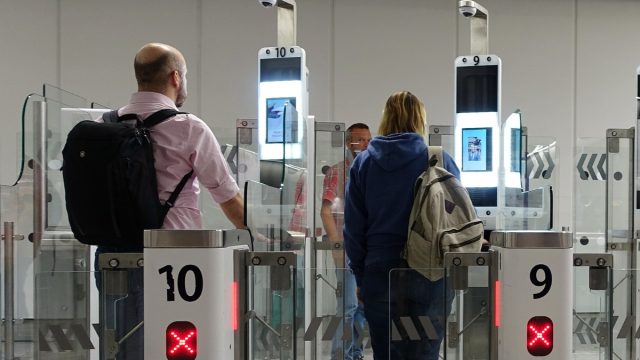TSA’s New Facial Recognition Is Changing Airport Security

Remember when you had to check-in for your flight in person and speak with an airline worker? Well, over the last several months, AI has slowly been changing the landscape of Transportation Security Administration (TSA) checkpoints. Last year, TSA announced it would be rolling out facial recognition technology in the form of Credential Authentication Technology (or CAT for short) units—a high-tech machine that validates passengers’ identities and flight information—to speed up security lines and reduce touch points. And it has been expanding the deployment of those units over the past several months. CAT units are among the many ways AI has replaced airport employees.
Anyway, you may be wondering… how will CAT units affect my traveling?
Well, if you’re departing out of an airport with CAT machines, your security checkpoint will now be completed by a computer, rather than a TSA agent—and you’ll no longer need to show your boarding pass. You will only need a government issued ID or passport.
According to an April 26 press release, Baltimore-Washington International/Thurgood Marshall Airport (BWI) is the most recent international airport to introduce the CAT unit. BWI is reportedly using the second generation of CAT units, called CAT-2, per Insider.
BWI now has the highest volume of CAT units overall. As of last month, TSA implemented 36 CAT-2 stations. To put that in perspective, Denver International Airport only has five CAT-2 units.
READ THIS NEXT: TSA Is Under Fire for a Controversial Change to Airport Security.
Similar to the AI machines used for passport security, CAT units will capture a photo of a traveler’s face and match it with the face on a passenger’s identification card. It’s like school picture day, only a lot less fun.
Not only are CAT units expected to speed up the process and reduce touch points, but “the technology enhances detection capabilities for identifying fraudulent documents,” TSA’s Federal Security Director for Maryland Christopher Murgia claimed.
“This helps ensure that we know who is boarding flights,” Murgia said. “The system also confirms the passenger’s flight status by verifying that the individual is ticketed to fly out of that airport on that day.”
To ease privacy concerns, TSA claims that CAT units will not store or save passenger photos.
RELATED: For more up-to-date information, sign up for our daily newsletter.
Albeit, that doesn’t ease the concern of many when it comes to misidentifying people based on the color of their skin. Senators Edward Markey, Jeff Merkley, Cory Booker, Elizabeth Warren, and Bernie Sanders are calling on the TSA to press pause on facial recognition technology for this reason.
“TSA’s facial recognition is also likely to exacerbate racial discrimination” the senators warned in a letter to the TSA.
The letter noted research on the accuracy of facial recognition. “A 2019 study by the National Institute of Standards and Technology tested 18 million photos of over 8 million people and found that Asian and African American people were up to 100 times more likely to be misidentified than White men by facial recognition technology, testing 18 million photos of more than 8 million people.”
And the senators also warned against TSA pushing forward with facial recognition technology so quickly. “American’s civil rights are under threat when the government deploys this technology on a mass scale, without sufficient evidence that the technology is effective on people of color and does not violate American’s right to privacy.”